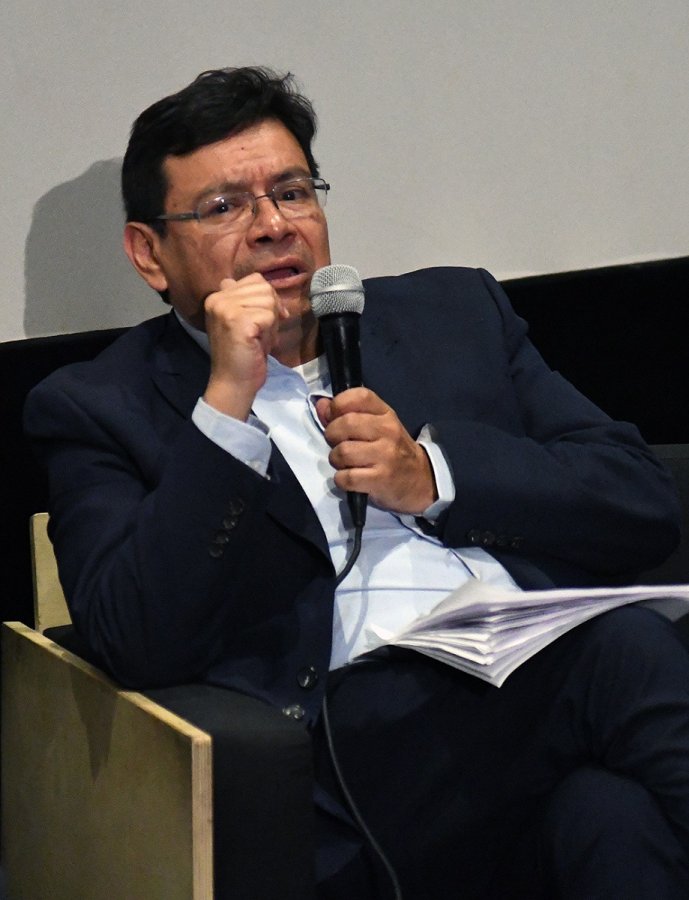Noticias
At the National Film Archive
William Faulkner found in cinema a way to tell accessible stories: Edgardo Bermejo
May 23, 2017William Faulkner was a difficult, powerful prose writer who reinvented English, a creator of hard-to-read novels, but he was also a great genius who found a way to tell light, accessible and well-functioning stories in cinema, said Edgardo Bermejo.
The writer, historian and journalist participated, accompanied by Raúl Miranda, deputy director of Documentation and Cataloging of the Cineteca Nacional (National Film Archive), in the series of talks Cinema and Literature: William Faulkner, organized by the Cineteca and the National Coordination of Literature of the National Institute of Fine Arts (INBA, for its acronym in Spanish).
The activity aims to reflect on the work of the writer and poet, and his relationship with cinema, based on studying and commenting different movies that were inspired in the American author’s works.
The room 4 Arcady Boytler of the Cineteca Nacional hosted the projection and analysis of To have and have not (1944), a movie that stood out at the time thanks to the most important talent of the production Warner, for example Faulkner did the coadaptation of the script based on the Ernest Hemingway’s homonymous novel.
The movie, by American director, writer and film producer Howard Hawks, tells how Harry Morgan is a captain who makes a living in Martinique by renting his boat for recreation until the situation arising from the war in Europe made his business bankrupt.
In spite of his feelings, values and beliefs, he will have to accept and fulfill a mission for the French resistance, since after realizing it he will receive a large amount of money that will get him out of his financial problems.
In this journey he will meet Maria "La flaca", a beautiful and rude woman, whom he falls in love with, so that the cynical and selfish captain will be sensitized, showing another face, taking an interest in the feelings and life of others, and striving in helping them achieve their goals.
Bermejo pointed out that in To have and have not there are different forms in which the work of William Faulkner is directly present: through dialogues, "which are very intelligent, in addition, he was the one who proposed to move the story of Cuba to Martinique, a fact that makes us miss the essence of the original novel that takes place in Cuba, where Harry is married”.
And finally, in the dramatic structure of the movie, because what Faulkner does is to create very short sequences, "which are all of a minute or two and change, this is a very classic narrative style of the American writer”, he revealed.
Regarding the title, Bermejo said that To have and have not talks about Harry, "a character who lives permanently between blows of luck and miseries".
Bermejo stressed that Faulkner made seven screenplays, five with director Howard Hawks, but To have and have not stood out because it was a very inward and psychological work, which explores and delves into the main character: Harry .
"Harry transforms himself drastically, from being a fisherman of bad luck to an action man who shoots a cop. It is the conversion of the anti-hero, the individualist, to a man who embraces a cause”.
"In this context, this is a unique, legendary movie that gathered the talent of many people including the two American Nobel Prize winners of that time: Ernest Hemingway and William Faulkner, so it is difficult to see such talent together in a movie again”.
Finally, the historian pointed out that To have and have not is a very important, risky and astonishing movie that transcended even though it was filmed under budget and in a studio.
"The movie was a box office flop, it did not have the strength of Casablanca, but it has been reclaimed over time as a classic of the twentieth century”.
"Here, we see the magic of Hollywood that with its resources, still very precarious, made the viewer move to the Caribbean when the movie never left the four walls and the ceiling of a studio”.
The series Cinema and Literature: William Faulkner will continue on Monday, May 29th, at 6:00 p.m., with the projection and analysis of Martin Ritt's movie The Long and Hot Summer. Free entry. Tickets available.
Mexico,Distrito Federal
